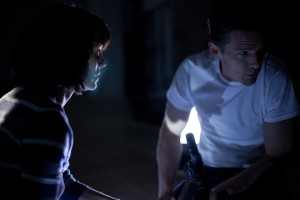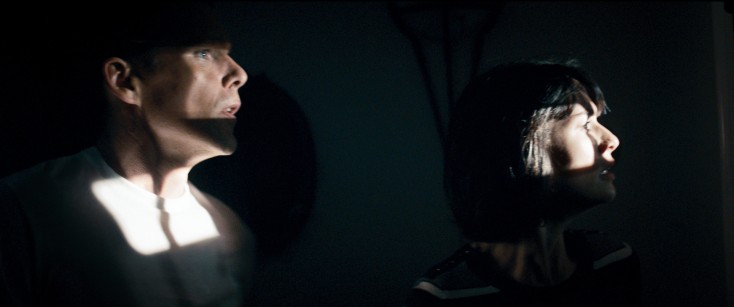
(l-r) Mary (LENA HEADEY) and James Sandin (ETHAN HAWKE) make unthinkable choices in “The Purge.” ©Universal Studios. CR: Daniel McFadden.
By ANGELA DAWSON
Front Row Features
HOLLYWOOD—Ethan Hawke appears in two very different movies now showing in theaters—and that’s just as the chameleon-like actor likes it.
“I’ve managed to do this for more than 20 years and keep dodging and weaving and not being one thing,” says the veteran performer. “I’ve always resisted (being typecast). I’ve always wanted the freedom to do something else.”
Romantic drama fans can catch him in “Before Midnight,” a thoughtful relationship movie that continues the saga of star-crossed lovers Jesse and Celine (Julie Delpy), while those looking for pure escapist entertainment might want to check out Hawke in the futuristic thriller “The Purge.”
Hawke’s latest works are quite different genre-wise, but they do have some similarities. Both find Hawke collaborating with filmmakers he’s worked with previously. In “Before Midnight,” Hawke joins forces again with writer/director Richard Linklater. He reprises Jesse Wallace, an American writer that he first played 18 years ago in “Before Sunrise” and again in “Before Sunset.” With “The Purge,” Hawke reteams with writer/director James DeMonaco, who directed him in “Staten Island, New York” and who wrote “Assault on Precinct 13,” in which he starred.
Both films are rated R by the MPAA: “Before Midnight” for nudity (because co-star Julie Delpy is momentarily topless in one scene), and “The Purge” for its depiction of violence. It’s about a society where people are allowed to commit crime without consequence for a 12-hour period once a year.
The twice-married Hawke is articulate, quick and upbeat as he talks about his latest movies. He is proud of what he has accomplished in each of his new films. He plays characters that aren’t quite perfect but are trying their best given the challenges they face.
The workhorse actor has more diverse projects in the works. He stars in Yaron Levy’s action thriller “Getaway,” co-starring Selena Gomez, which hits theaters August 30. And he currently is directing a documentary about 85-year-old piano maestro Seymour Bernstein.
As he arrives for a press conference, Hawke appears youthful despite some grey in his beard stubble. He gamely announces, “Well, class, today we’re going to talk about violence in America.” For the next several minutes, he offers his views on the subject and more.
Q: In “The Purge,” you play a father who must protect his family. Why do you think the idea of a family in peril makes for a good suspense/horror film?
Hawke: It’s kind of obvious. It’s everybody’s biggest fear. There’s a moment in the movie where you see the husband and wife loading guns and he tells her how to take the safety off. It’s every parent’s worst nightmare. Nightmares are a strange thing because your worst fear is sometimes something you enjoy thinking about, for some strange reason. I don’t know why that is. It’s some kind of fantasy that people play out: what would I do to protect my children? So you watch it play out. I’m petrified of such a thing. I don’t really enjoy thinking about it.
Q: How did you like working with Lena Headey, who plays your wife in “The Purge?”
Hawke: She and I did a movie together called “Waterland” in England when I was 18 and she was 14. I always thought she was a magical actress. I remember thinking there was something really special about her. I’ve watched her from afar throughout her career. She plays this part so interestingly. It’s kind of my favorite aspect of the movie, partly because I’ve known her for so long, it made the family dynamic really easy.
Q: What have you learned about yourself since you made “Before Sunrise” in 1994?
Hawke: I’ve learned that I’m not as smart as Julie (Delpy). (He laughs.)
Q: Has anything surprised you?
Hawke: Eighteen years after Julie and I auditioned for Rick (Linklater) for “Before Sunrise,” this little romance, so the idea that we would have this lifelong collaboration and pour so much of ourselves into it, that’s the thing that’s a surprise.
Q: Last year’s you starred in another horror movie called “Sinister.” What was it that you liked about doing a horror movie and what made you want to return to that genre with “The Purge?”
Hawke: When I was younger, I loved genre movies and one of my first directors was this guy named Joe Dante, who had directed “The Howling,” “Piranha” and “Gremlins.” He taught me what was possible with a genre movie. A good genre movie is really scary and fun but it also has some subterranean political message. I did (the vampire movie) “Daybreakers” and, in a way “Training Day” is a genre movie too. It’s a cop genre. Good genre movies are like trying to write a good haiku. There are certain things you have to do to fulfill the audience’s expectations but inside that you have this complete freedom to talk about anything you want. Who wants to see a movie about gun violence and class in America but if you set it in this fun, terrifying rollercoaster ride of a movie, you can talk about whatever you want.
Q: How realistic do you think the premise of “The Purge” is and what do you think would really happen?
Hawke: I think it plays into an age-old human fear. Whenever we see glimpses of revolution or riots on television or absolute anarchy, or when we watch kids on the schoolyard behave like a pack of wolves, it can be really terrifying. I know it’s trying to put its finger on touching something. It’s an extremely violent film with an anti-violent message. It may be an oxymoron. It doesn’t make sense. But I find something powerful about the movie where you see an African-American actor run through a gated community being shot at that is all of a sudden not science fiction. The whole Trayvon Martin incident happened while we were making this movie. This country is obsessed with violence and our right to protect our violence. You’re called unpatriotic if you’re not violent. So this movie heightens it. It’s taking a certain thing and exaggerates it.
Q: As a writer yourself, did you have input into the script or did you take a hands off approach?
Hawke: I have a lot of respect for (director) James DeMonaco. It’s very difficult to make a movie like this with this (modest) budget. He had his work cut out for him. I couldn’t begin to write a movie like this. I could only try to help myself create a full three-dimensional character. This character was hard to play in a lot of ways because he’s not overtly a bad guy. He thinks he’s a good guy. It’s easy to play a villain and it’s easy to play a hero, but this guy (that I play) is this gray zone of a person, who’s culpable for a lot of different things in his life but isn’t aware of them and slowly wakes up.
Q: Would you rather have a gun or weapon to defend your family if attacked?
Hawke: If nobody had a gun, I wouldn’t have to worry about that. That would be more my theory. There’s a knee-jerk response in America that more walls and more guns make people safer. I’m entirely suspect of that way of thinking.
Q: There was a “Star Trek” episode that dealt with a similar premise of setting aside a day of raping and pillaging. Have you seen that or was there talk of that episode before you made this movie?
Hawke: I’ve seen all those old “Star Trek” shows but I’d forgotten about that one. When I first read this I thought it really could be a (science-fiction author) Philip K. Dick short story or something. It didn’t surprise me. Those old “Star Trek” episodes are good.
Q: Does it blow your mind that both “The Purge” and “Before Midnight” are rated R?
Hawke: It’s amazing. It’s almost like something out of “The Purge” that “Before Midnight” would be rated R. It’s fascinating to me because of a breast. I go see PG-13 rated movies with my son that have a death count in the thousands. So I never know how they come up with (the MPAA rating). Our country’s relationship to sex and violence is a fascinating conundrum to me, both puritanical on one level and libertarian in the next. When we were doing interviews for “Before Midnight,” it was only the American press that was concerned with Julie’s breasts. We did interviews elsewhere around the world and nobody asked about her t***, but here everybody was like, “Can we talk about her breasts?” We’re like little abused children who never saw a t*****. In a way, it’s the truth of what we prioritize. I don’t know what to say about it. Sex is a lot scarier to us than violence. For us, intimacy is scary. We could write essays about it. I don’t understand what it is but it’s an interesting observation.
Q: Do you think “The Purge” concept would work for a society? Are humans inherently violent?
Hawke: It’s moments like this that I wish I were an anthropologist and I could answer this. If you study the history of mankind, there seems to be a history of violence. It’s kind of terrifying. We’re fascinated by things that scare us, and one of the things that scare us is violence. If you think about it, the great mass of us never performs any act of violence. For every crazed kid in Boston who wants to blow something up, there are hundreds of people running to stop him, and thousands crying over the fact that it did happen. So it’s a conundrum. Violence exists and it’s a part of our life, and we are obsessed with what we’re scared of but it certainly doesn’t define us.
Q: Why are you attracted to smaller projects now rather than big-budget films?
Hawke: I’ve always done small projects. There’s nothing recent about that. I’ve always been interested in creative freedom and the truth is the more you get paid, the less freedom you have. I never wanted to do “A Long Day’s Journey Into Night” and have the audience go “Oh, there’s Batman!” There’s nothing wrong with it. In many ways, as I get older I wish I made other decisions. Sometimes I watch how people have parlayed their careers one way or another but I just tried to do things that interested me. They didn’t all turn out good. I haven’t made perfect decisions but I’ve tried to stay interested in my job, and I’ve succeeded at that.





